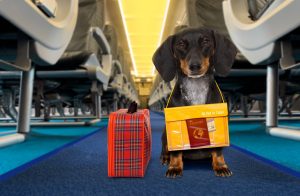 Air travel will change in more ways than one during the COVID-19 era and some owners of emotional support animals may be unhappy, especially if they’ve racked up frequent flyer miles with certain airlines.
Air travel will change in more ways than one during the COVID-19 era and some owners of emotional support animals may be unhappy, especially if they’ve racked up frequent flyer miles with certain airlines.
As of January 11, 2021, substantial amendments to the U.S. Department of Transportation (DOT) Air Carrier Access Act (ACAA) regulation on the transport of service animals by air take effect, paramount of which will strictly define a “service animal” as a dog, regardless of breed or type.
Recall that since 2011, the Americans With Disabilities Act (ADA) has allowed for miniature horses to fit the definition of service animal, whereas an “emotional support animal” could be any type of animal. Now, on an airplane, both are defined only as dogs and, with the new rule, airlines now have a long leash to decide whether or not they’ll even allow those canine emotional support animals onboard if classified as pets.
Airlines will also be permitted to limit the number of service animals that one passenger may bring onboard an aircraft to two (2) service animals. However, if the animal doesn’t fit under the seat in front of you, airlines may require you to purchase an additional seat or take another plane if no open seat in a commensurate class is available.
“Passengers, including passengers with disabilities traveling with large service animals, are not entitled to more space than they purchased,” the Rule explains.
It wasn’t just complaints about “service ducks” or horrifying tales of “comfort hamsters” being flushed down airplane toilets that prompted the regulatory about-face, but a Congressional mandate in the form of the Federal Aviation Administration Reauthorization Act that required the development of minimum standards for service and emotional support animals, along with consideration of whether to align the DOT’s ACAA definition of a service animal established by the U.S. Department of Justice in its 2008 ADA implementation.
With the U.S. Department of Housing and Urban Development (HUD) also having issued guidance on the issue in late January 2020, it’s not a hard stretch to imagine the specific DOT rules about to take effect will soon begin to further influence its stance in the future.
“Given these developments, board members may want to take this time to evaluate its community association’s rules, policies and governing documents,” Alessandra Stivelman Esq., shareholder at Eisinger Law. “By the same token, those who may own exotic emotional support animals may want to look ahead to what changes may result for both housing and travel purposes.”
Much like the cascade of woes experienced by community association managers and various landlords, the new rule was prompted by an increasing number of related complaints and requests for regulation made by both the disabled community and airlines alike.
“Inconsistent definitions among federal agencies of what constitutes a service animal have invariably led to more travelers misrepresenting their pets as such,” said Carolina Sznajderman Sheir Esq., shareholder at Eisinger Law. “The disruptions caused by their requests to transport unusual species of animals onboard aircraft led to the inevitable increase of animal misbehavior incidents and an ultimate erosion of public trust in legitimate service animals.”
Among its additional provisions, the new DOT Rule:
- No longer requires airlines to accommodate miniature horses, cats, rabbits, birds and all other service animals that airlines are currently required to transport;
- Requires airlines to treat psychiatric service animals the same as other service animals that are trained to do work or perform tasks to assist a qualified individual with a disability and no longer allowing airlines to impose additional requirements on individuals traveling with psychiatric service animals as a condition of transport;
- Allows airlines to require service animal users to provide a form developed by the DOT attesting to the dog’s health, behavior, and training to assist the airline in determining if the dog poses a direct threat to the health or safety of others but prohibiting other forms.
- Allows airlines to require that service animals be harnessed, leashed, or tethered at all times in the airport and on the aircraft;
- Continues to allow airlines to refuse transportation to service animals that exhibit aggressive behavior and that pose a direct threat to the health or safety of others; and
- Continues to prohibit airlines from refusing to transport a service animal solely based on breed.
For now, the HUD guidance requiring justification for “unique” emotional support animals (i.e., anything other than a dog) remains in place, bolstered by Florida’s new law cracking down on abusive service animal-related “prescription mill” fraud. But with these recent developments, refined regulations could be on the horizon.
Alessandra Stivelman, partner at Eisinger Law is a Board Certified Specialist in Condominium and Planned Development Law and AV Preeminent® rated. She focuses her practice on community association and real estate law and can be reached at (954) 894-8000 x 304 or astivelman@eisingerlaw.com.
Carolina Sznajderman Sheir, partner at Eisinger Law, is AV Preeminent® rated and focuses her practice on real estate law, community association law, commercial litigation and developer representation. She can be reached at csheir@eisingerlaw.com or 954-894-8000 ext. 238.
Eisinger Law is a multi-practice Florida law firm focused on community association law, real estate law, developer representation, civil/commercial litigation, insurance law, estate planning and probate. For more information, visit eisingerlaw.com or call 954-894-8000.
